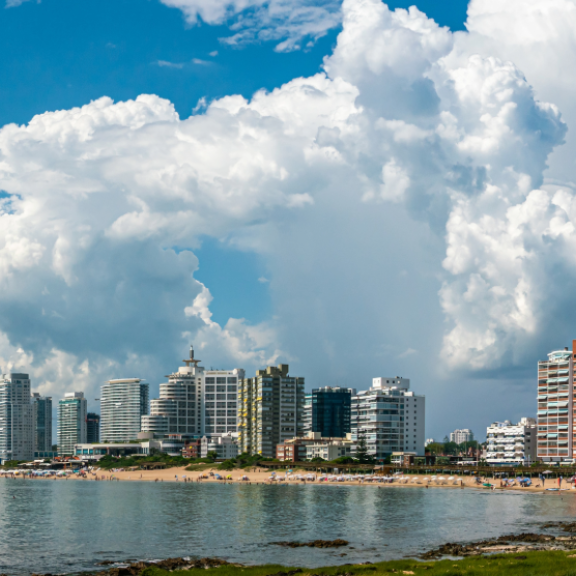
Emigrate to Uruguay
Emigrate to Uruguay: Find out the most important information for your stay here
Emigrating to Uruguay offers a unique blend of nature, culture and quality of life. The South American country is known for its green landscapes in the interior and its beautiful beaches along the coast. The capital Montevideo, a popular destination for emigrants, impresses with its Plaza Independencia, which was once the site of a Spanish citadel. From here, you can reach the historic old town, the "Ciudad Vieja", characterized by Art Deco buildings, colonial buildings and the Mercado del Puerto - a traditional harbour market famous for its numerous steakhouses. Along the waterfront promenade "La Rambla" there are fish stalls, piers and extensive parks that invite you to relax. Anyone wishing to emigrate to Uruguay will benefit from the relaxed way of life, the stable political situation and the friendly population.
Facts about Uruguay
Capital City
Montevideo
Population
3.42 million
Surface Area
109,494.96 mi² or 176,215 km²
Continent
South America
Official Language
Spanish
Currency
Uruguayan peso (UYU)
Emigrating to Uruguay: An overview of the political system
Uruguay, the second smallest country in South America, is about half the size of Germany and is home to around 3.4 million people, 1.4 million of whom live in the capital Montevideo. The 1967 constitution establishes Uruguay as a democratic presidential republic with constitutional principles. After a military dictatorship from 1973 to 1985, the country has developed into a stable pioneer in the region, both politically and economically.
As a founding member of Mercosur, whose secretariat is based in Montevideo, Uruguay plays a central role in regional trade. The state structure is centralized and the country is divided into 19 provinces (departamentos), which only have limited autonomy. Uruguay attaches great importance to the separation of powers and secular values, which are enshrined in the constitution. The country's social system was modeled on the European model and offers comprehensive rights for employees. These stable political and social conditions make Uruguay an attractive destination for emigrants looking for security, democratic stability and a high quality of life. Anyone considering emigrating to Uruguay will find a country with a modern infrastructure and a diverse media landscape.

Climate in Uruguay: Important information for emigrants
Uruguay has a temperate climate with distinct seasons, which makes it attractive to many who want to emigrate to Uruguay. The summer months from December to April bring warm temperatures of between 25 and 28 degrees, and in the subtropical north temperatures can even rise above 30 degrees. In the coastal regions, however, it is somewhat cooler and wetter than in the northwest of the country.
In winter, the average maximum temperature is around 15 degrees, although temperatures can occasionally drop below freezing. Annual rainfall averages around 1200 mm and is distributed relatively evenly throughout the year. For expats who prefer a temperate climate with pleasant summers and mild winters, Uruguay offers an ideal environment with varying climatic conditions from the coastal regions to the interior.

Healthcare system in Uruguay: Important facts for emigrants
The healthcare system in Uruguay is considered one of the best in South America and offers high-quality and accessible medical care. It is based on a dual system that includes both public and private healthcare services. The state health insurance company FONASA offers comprehensive cover, while the state health authority ASSE provides numerous preventive healthcare programs. Those wishing to emigrate to Uruguay benefit from a well-organized healthcare system that is internationally recognized. This guide explains the most important aspects of Uruguayan healthcare and is particularly useful for expats looking for reliable and affordable medical care.

Emigrating to Uruguay: An overview of the economic situation and quality of life
The gross domestic product per capita of Uruguay in 2023 amounted to 21,656.98 US dollars. The Gini coefficient of wealth describes the distribution of wealth. The indicator is an established, internationally comparable measure of wealth inequality. It is measured on a scale from zero to one. The higher the value, the greater the inequality. The Gini coefficient in Argentina is expected to be 0.39 in 2024 (source: Statista).
Uruguay offers a high standard of living thanks to its good infrastructure, clean environment, high standard of education and well-equipped healthcare facilities. The country has one of the lowest crime rates in Latin America, which offers emigrants a safe and family-friendly environment. Anyone wishing to emigrate to Uruguay will find the immigration conditions comparatively uncomplicated. Obtaining citizenship is also easier than in many other countries. The country impresses with its diversity: from extensive beaches and historic cities to picturesque landscapes - Uruguay offers numerous highlights for emigrants.

National holiday
Independence Day
Emigrate to Uruguay - Entry Requirements
Entry is possible for German nationals with the following documents:
- Passport: Yes
- Temporary passport: Yes
- Identity card: No
- Temporary identity card: No
- Children's passport: Yes

FAQs for emigrating to Uruguay
Where can I find relevant information about my country of entry and the entry regulations that apply there?
We have compiled destination country information as well as entry requirements and customs information for many countries in the Relocation Service section of our website and are constantly expanding this section.
Can I use my own container that I already own for the move with DACHSER & KOLB?
For every removal, which we at DACHSER & KOLB always offer as a door-to-door (full service) removal, a container is rented for the duration of the removal. We therefore do not offer the option of using your own container.
Who is responsible for my move abroad and the services I need there?
As a FIDI member, we work abroad with selected, long-standing partners who work in accordance with our service standards.
Are my removal goods insured in the event of damage?
For every overseas move, we naturally cover transportation insurance at current value for the used household goods and personal belongings
What types of transportation do you offer for overseas relocation?
It is generally possible to carry out overseas removals via air freight or sea freight. In the case of sea freight, it is possible to ship the removal goods as additional cargo (“LCL shipment” with Liftvan) or with a container (FCL shipment in 20 feet, 40 feet or 40 feet high cube). We will be happy to discuss which option is best for you in a personal consultation.
When and how must the move be paid for and what is the payment deadline?
You will receive an invoice a few weeks after placing the order and pay the full amount directly in advance.
Do I have to pay taxes and customs duties on my removal goods?
Removal goods can be imported tax and duty-free into most countries if you have a valid residence permit. We will be happy to check the options for importing the removal goods for your desired destination country in a personal consultation.
Are you interested in moving to Uruguay or another destination country?
Then do not hesitate and contact us today.
Alexander Brugger
Teamlead Customer Service & Sales - AIR&SEA






